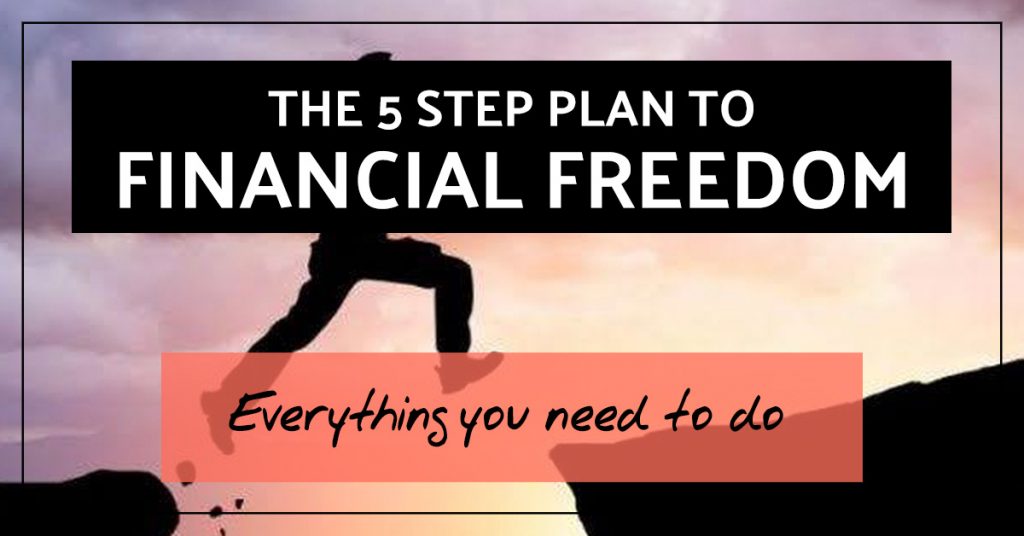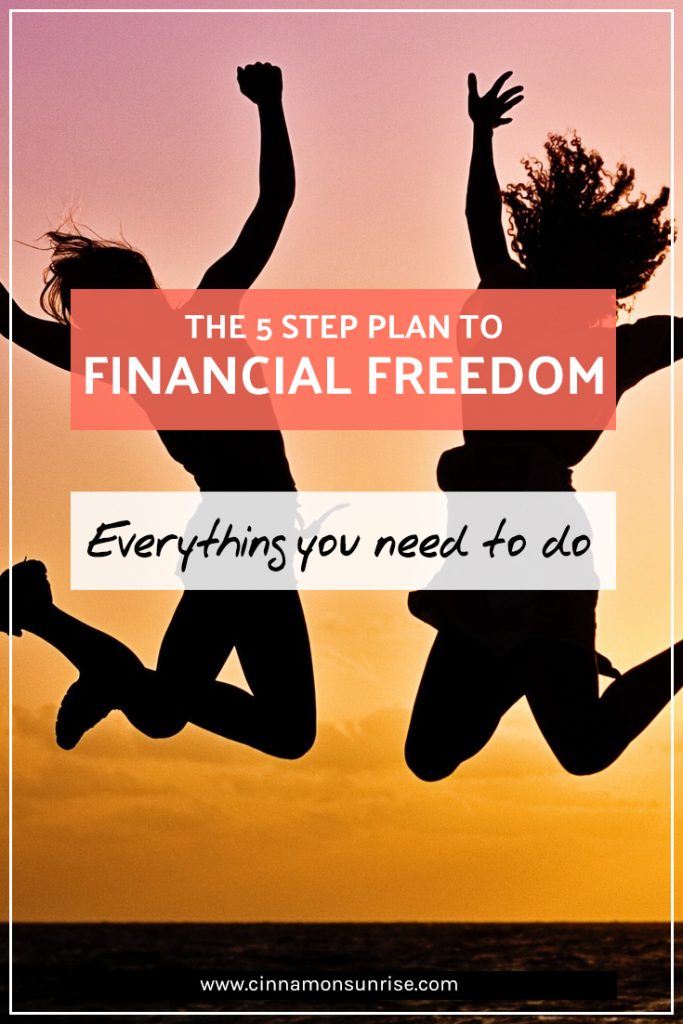This post may contain affiliate links. If you click on an affiliate link and buy something, I get a percentage of the sale. Find out more by reading my affiliate policy and disclosure.
I came up with the following five steps to financial freedom. This isn’t a new approach – most financial gurus will advise you follow the same steps, though the emphasis on each step might be different.
Why would you want to aim for financial freedom? Well, even if you love your job and enjoy going to work, financial freedom will remove a lot of stress from your life. You won’t have to worry about getting sick, about emergencies, or about recessions and being laid off.
Financial freedom allows you to escape from the rat race, and enjoy life on your own terms.
With that said! It’s important to balance your goal of financial freedom with your other goals, such as raising a family or travelling.
Luckily, there is a simple route to financial freedom. (Though as we will see, simple doesn’t always mean easy.)

The five steps to financial freedom
- Increase the gap between what you earn and what you spend
- Pay off debt
- Save an emergency fund
- Increase your long-term savings
- Invest
Let’s look at each of these steps in a bit more detail!
The five steps to financial freedom
1: Increase the gap between what you earn and what you spend
If you currently spend more than you earn, congratulations – you’re moving ever further away from financial freedom.
(I accept that this is sometimes a necessary evil, and I have myself gone into debt at various points to obtain things that were more important than financial freedom. Nonetheless, if financial freedom is a goal of yours, then you should seek to minimise this as much as possible.)
If you currently earn more than you spend, congratulations – you’re making progress towards financial freedom.
There are two ways to increase the gap between what you earn and what you spend. One is to cut costs. This is the ‘frugal living’ approach. The other is to increase what you earn. This is the ‘high performers’ approach. A combination of the two works extra well.
The frugal living approach
Start by looking at your big expenses, because this is usually where you can make the most savings.
- Move to a smaller house. Or forgo the house and live in an RV, in a tent, in a van or some other creative solution. See my post on cutting back on your expenses.
- Get rid of your car.
- Slash your food costs. Cut coupons. Don’t eat out. Cook in bulk. Eat lots of beans and rice. See my post on how to save money on your grocery bill.
There are lots of blogs out there dedicated to frugal living. Here are two of my favourites!
The high performer approach
Salary – particularly in the private sector – is not fixed. I have a friend who went from around a $70k income to a $170k in the space of a year. I’m sure you can see how that would change the game in terms of saving and investing.
Your pay is dependent on a lot of factors, including your industry, your sector, your work history, your education and so on. However, if you can increase your income by even a small amount, that creates additional money for you to use towards your goals.
- Negotiate for a pay rise. Here’s a decent blog post that goes into detail on how to approach a salary negotiation.
- Change jobs or switch careers. Not a short term solution, but often a lucrative one. Keep an eye on job listings even when you’re not actively job hunting. Apply for jobs regularly, to stay in practice.
- Take on a side business. This can range from freelancing to setting up your own business. See my post on earning money on the side and my guide to making money on Fiverr.
There are a few blogs out there dedicated to becoming a high performer. My favourite is I Will Teach You To Be Rich. His courses are not cheap, but get on his mailing list and you’ll get a lot of material for free.
Fantastic – now you have some spare money each month! But what should you do with it?
The five steps to financial freedom
2: Pay off debt
PREFACE: Whilst the next step is paying off debt, I want to note that at this point you should also join your employers pension scheme or 401K. Even small amounts invested early add up, and any employer matching is free money.
High interest debt is a financial freedom killer. Credit cards, pay day loans, bank loans, buying a sofa on finance – pretty much all of these are ways of increasing the amount that you spend on any one thing.
Again: sometimes it is necessary. I’ve been in credit card debt, and I don’t regret it. You need to eat! However, as soon as you manage to start earning more than you spend, you need to tackle your debt.
- Reduce your interest. Quite often credit card companies will let you transfer a balance from one credit card to their own card with an introductory rate offer of 0%. This means you’re not having to worry about interest increasing the amount you need to pay off. Here’s a good guide that explains the process and the best cards to use and here’s one for balance transfer cards in the USA.
- Set up an automatic monthly payment. This is the most efficient way to pay off debt. Figure out an amount you can afford, and set up a bank transfer or direct debit for the day after pay day. There will be no temptation to spend the extra money and no will power or memory involved.
- If you get any extra money, make an additional payment towards the debt.
There are loads of blog posts about paying off debt. Here’s one on the Debt Snowball method.
So now you’ve paid off all your debts and are wondering what’s next. Good news.
The five steps to financial freedom
3: Save an Emergency Fund
A typical emergency fund represents 3 months of expenses. It’s meant to stop you from having to go back into debt if you should lose your income or your expenses should suddenly increase for any reason. It’s to protect you from job loss, sickness, your house flooding… all of those scenarios that are made worse if you have to start stressing about money at the same time.
A few things to note about your emergency fund.
- It should be in an easy access account with a reputable company. You don’t want to have to wait a month to withdraw your money if you need it straight away.
- Typically, the easiest thing to do is to open a savings account with your current bank account company.
- Set up an auto-transfer so you are paying in a set amount each month.
- The interest rate is not completely unimportant, but ultimately the purpose of this money is not to earn you income but to protect you.
So you’ve socked away 3 months of living expenses (well done!) and are wondering… what’s next?
The five steps to financial freedom
4: Increase your long-term savings
Now it’s time to start thinking long term. Most people have some mid-range savings goals (e.g. putting a deposit down on a house, going on an exotic holiday to mark an anniversary, funding a lavish wedding, saving up to cover maternity leave etc.) and most people will also want to start thinking seriously about retirement.
For the mid-range savings goals, look for a high interest savings account. In the UK, a regular saving account often offers higher interest than a standard savings account, though the catch is usually that you need a current account with the same bank.
For savings goals, it helps if you have an idea of what you want and the time frame in which you want achieve it. For example, maybe you want to go on an around the world trip for your 40th birthday. You can calculate rough costs, and then work out how much you need to save towards it each month.
For retirement, you should try and increase the amount you put into your pension. The more you put into your pension, the more comfortable you will be when you stop working. In an ideal world you should be putting away 10-15% of your salary, but the older you are and the less you currently have in your pension will mean increasing that. However, if you can’t afford that then don’t panic. Put away what you can, and increase the amount later.
The five steps to financial freedom
5: Invest
If you’ve completed all the steps above you’re in pretty damn good shape. However, if you want financial freedom earlier than the average retirement age, you’ll need to start earning higher interest rates, which usually means investing. Note that investments are not protected and your capital is at risk.
Here are some options:
- Try a peer-to-peer lender like Zopa*. Average return at the moment is between 4-5%.
- Try an investment platform like Vanguard.
The five steps to financial freedom
The missing step: work less, donate, relax
All of the above will put you well on track to become rich. However, wealth is not everything.
Whilst we live in a capitalist economy you will need to pay at least some attention to your finances.
However, being rich is actually not a particular interesting goal. It will help make you safer, and it will potentially give you more freedom. But it doesn’t make the world a better place (on the contrary, it probably makes it a worse place). It doesn’t help your children grow up in a world where they are surrounded by skilled, educated, happy peers. It doesn’t lessen inequality. It doesn’t help you feel good about yourself. It doesn’t contribute anything back to the society that raised you.
So, at every point in this journey, it’s perfectly sensible to stop and ask yourself “is this enough?”.
‘Enough’ is different for everyone. If you’re an active risk taker, you’ll need more money. If you live in a country without socialised health care, you’ll need more money. You’ll want to make sure you’ve checked off those big savings goals, like saving up for your children’s education or making sure you’ll have enough in retirement.
But when you hit that point where you do have enough, when you’re getting by well and there’s enough in the bank to protect you, it’s time to start thinking bigger.
Can you donate that extra money to a cause you care about?
Can you cut back your hours so you have less income, but do have more time:
- with your family and friends?
- to exercise, travel, spend in nature?
- for volunteering?
- to spend in your community?
Where are you in the five step plan? What parts do you struggle with?
Pin for Later!
